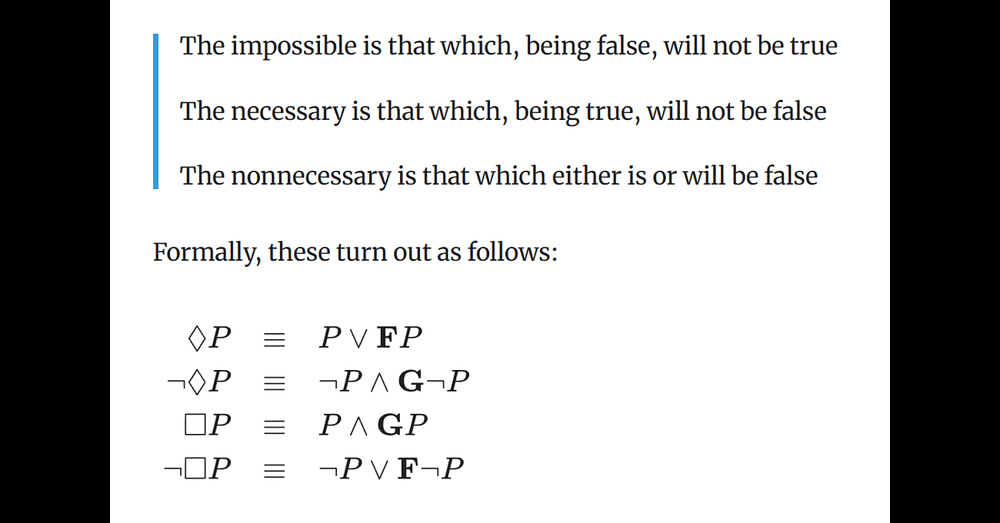
Within modal logic, necessity and possibility are interdefinable. In other words, we can define (or explain) necessity in terms of possibility, and we can define (or explain) possibility in terms of necessity.
To say that something is possible isn’t to say that it’s likely or unlikely, or that it probably will happen some time in the future. In this context at least, what is important about any given x being possible is that its (as it were) non-happeningness isn’t necessary.
So there’s nothing necessary about there being no unicorns or seven-foot-high cats.
Again, there are no unicorns. However, it’s not necessary that there are no unicorns. And there probably couldn’t be seven-foot-high cats. However, it isn’t necessary that there aren’t any, or that there won’t be any in the future.
We can kind of invert this possibility-necessity relation by making it a necessity-possibility relation. So instead of defining possibility in terms of necessity, we can now define necessity in terms of possibility.
Something is necessary if it has to be the case, or if it must happen. In terms of possibility, we can say, “that its failure to happen is not possible”. So if we drop a stone here on Earth, it must fall to the ground (i.e., if there is nothing material stopping it). It’s not possible that it would, or could, just float in the air.
This is natural necessity, and we can oppose it to logical necessity. It’s not logically necessary that a stone must drop to the ground.
Semantic Necessity?
Can we say that it is necessary that all bachelors are unmarried? After all, married bachelors aren’t possible.
However, is this simple semantics?
The word ‘bachelor’ is a synonym for ‘unmarried man’. Thus, if we say that
“John the bachelor is married.”
we’re also saying that
“John the unmarried man is married.”
Thus, with the (as Quine put it) “substitution of synonym for synonym”, we arrive at a straightforward assertion of a logical contradiction. In other words, we’re saying that John can be both unmarried and married at one and the same time. Thus, John’s unmarried status is necessary precisely because he’s a bachelor. Therefore, his being a married bachelor isn’t possible.
To repeat. The necessity of the statement
“John the bachelor is unmarried.”
being true is partly a result of the impossibility of the statement
“John the bachelor is married.”
being true.
[See note.]
From all the above, we (to use another modal term) couldn’t have necessity without possibility (or something’s impossibility). Similarly, we couldn’t have possibility with necessity (or something’s being necessary).
Note:
The American philosopher W.V.O. Quine (1908–2000) critically examined this account of what can be called conceptual (or linguistic) necessity. However, it was worth noting the basics first. [See Quine’s ‘Two Dogmas of Empiricism’.]










No comments:
Post a Comment